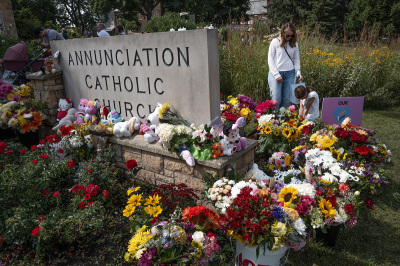
After yet another murderous rampage by an armed attacker upon a school, the mockers are back. But the mockers aren’t scoffing at deranged individuals bent upon evil. Their contempt is aimed at Christians who express sympathy and offer prayers for the victims and their families.
The murder of two children and the injury of many others at the Annunciation Catholic School rightly stirred strong emotions nationwide. Violence is never welcome, and violence against children is especially egregious. For Christians who express their emotions in light of God’s providential oversight of the world, an offering of prayer is not out of bounds. In the vein of saying, “I’m sorry for your loss,” to someone who has had a death in the family, you’ll nearly always — and quite appropriately — find Christians offering to keep victims of violence in their thoughts and prayers.
For some reason, this gets under the skin of many. Minneapolis Mayor Jacob Frey (D) launched the first volley, saying at a press conference, “Don’t just say this is about thoughts and prayers right now. These kids were literally praying – it was the first week of school, they were in a church.” From there, the now-familiar “thoughts and prayers” sneering snowballed. The discussion really got heated when former White House Press Secretary Jen Psaki posted on X, “Prayer is not freaking enough. Prayers does not end school shootings. Prayers do not make parents feel safe sending their kids to school. Prayer does not bring these kids back. Enough with the thoughts and prayers.” When current White House Press Secretary Karoline Leavitt rebuked her predecessor’s glib remarks, California Governor Gavin Newsom (D) got in on the game, posting, “These children were literally praying as they got shot at.”
The mocking of “thoughts and prayers” — especially following murderous attacks involving guns — isn’t new. Ads like this horrific spot by a group called Mothers for Democracy follow the general tone. The ad shows a little girl falling into a swimming pool, unable to swim, and the girl’s mother stopping at the side of the pool to pray that her girl wouldn’t drown. Neighbors and others offer thoughts and prayers, and nobody dives into the water.
The whole concept is absurd. Nobody who offers thoughts and prayers during a tragedy thinks that they wouldn’t or shouldn’t do anything to save a victim. In fact, prayer often fuels and undergirds action for the believer. The mockers offer this weak non sequitur because their solution (which is usually more gun control in an already highly-regulated area where such controls have failed) is the only feasible plan for action in their eyes.
In Scripture — and in the Christian life, prayer is related to many aspects of life: need, sadness, frustration, joy, and thankfulness are all expressions of prayer to God. But the prayer of need is also closely related to God’s provision of gifts. In his 1909 book “The Wonderful Works of God,” Dutch theologian Herman Bavinck wrote about this relationship with regard to God’s gift of companionship:
“The best things come to us as gifts; they fall into our laps without labor and without price. We do not earn them nor achieve them: we get them for nothing. The richest and most precious gift which can be given to man on earth is woman. And this gift he gets in a deep sleep, when he is unconscious, and without any effort of will or fatigue of the hand. True, the seeking, the looking about, the inquiring, the sense of the need precedes it. So does the prayer. But then God grants the gift sovereignly, alone, without our help. It is as though conducts the woman to the man by His own hand” (p. 171).
Adam was alone in the garden. He could not find a helper (Genesis 2:20). He realized the end of his capabilities. That’s where prayer comes in — when we realize that we have no more to offer. We need a gift that we cannot provide for ourselves. When Christians legitimately offer prayer in times of tragedy, they are confessing that in the face of evil we need divine intervention. Yes, something needs to be done. But it’s not what the scoffers think, because the lawless often pays little heed to more laws.
In the face of evil like we saw in Minneapolis and have seen far too many times in other places, we don’t simply need “something to be done.” We need a gift. We need the grace of God to intervene in the hearts of people who do not deserve it. Thoughts that are focused on prayer are thoughts that are focused on the only one who can, as Jesus once prayed, deliver us from evil. Thinking and praying on that kind of deliverance is our only hope in the face of such evil.
Originally published at The Washington Stand.
Jared Bridges is editor-in-chief of The Washington Stand. He also serves as vice president for brand advancement at Family Research Council, where he oversees continuity and consistency for FRC’s message across its various platforms. He holds a B.S. in Communications from the University of Tennessee, and a M.Div. from The Southern Baptist Theological Seminary. Jared lives in Virginia with his wife and children and serves as an elder in his local church.
















